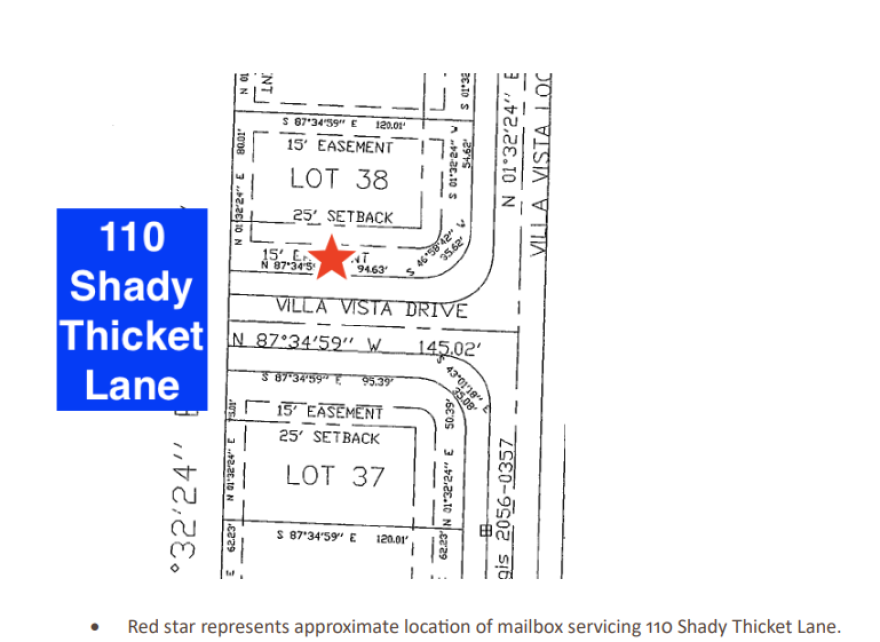Bryan Malinowski, who was involved in a shootout with federal agents Tuesday, was also involved in a legal fight with a neighbor over the placement of a mailbox, claiming it was placed illegally on his property.
A judge would go on to side with Malinowski’s neighbor, years before the 53-year-old director of Little Rock's Clinton National Airport was involved in the Tuesday shooting with agents of the Bureau of Alcohol, Tobacco, Firearms and Explosives.
In August 2018, Malinowski sued Eric and Victoria Pinter, who lived next to a property he owned. He said the year before they “without consultation or notice” built a mailbox on his property. The mailbox is 25 feet away from the Pinter residence of 110 Shady Thicket Lane in Little Rock, on a dead-end street. Pinter has always contended that the post office placed the mailbox in that location without his input. He says he even took a postal worker to look at the mailbox, but they said placing it farther down the lawn would make it unsafe for letter carriers to back out their trucks.
“Together, we measured the distance along the street and decided on a safe and reasonable location for the mailbox,” Pinter said.
Lot 38 is owned by Malinowski through a trust, and is not the same property that was subject to a search warrant Tuesday by the ATF. The mailbox was placed on the curb in front of his property. There is no house on Lot 38 where the mailbox is, nor was there one during the lawsuit. The property is thick with uncut greenery.
After it was built, Pinter, a real estate attorney, said Malinowski came to his door claiming to be an attorney and demanding the mailbox be moved.
“Mr. Malinowski looked me straight in the eye and told me that he had a law firm and that he had just won a half-a-million-dollar tax case,” Pinter said. He then said Malinowski said a bunch of “nonsense legal-ish sounding mumbo jumbo,” before the two politely walked down to the mailbox together to talk about the issue. Malinowski is not an attorney, something Pinter was quickly able to discern.

Then, the two struck up a tense correspondence over the placement of the mailbox. Pinter, who specializes in real estate law, said he did “full legal research” showing that the mailbox was legally placed.
“I am 100% comfortable with the reasonable placement of the mailbox within public use right away,” he said, explaining again that the United States Postal Service handles mailbox placement.
Pinter said he would be happy to remove the mailbox if the land was ever developed. However, he said he would only make the move one time if he was presented with construction plans from his neighbor. Malinowski went on to call this offering “condescending.”
Malinowski responded to Pinter’s letter, saying he had tried to handle the situation in a more “neighborly way,” but now had no choice but to sue. He said part of the reason he was suing Pinter was to get restitution for “the time to deal with your behavior.”
He called Pinter’s claims that the post office demanded the mailbox be put there “a whole story.” He said Pinter's “research” about the providence of the mailbox was not credible and that he was inventing laws to justify putting a mailbox on his property.
“You are wrong,” the letter from Malinowski to Pinter said. “You further attempt to dictate under what terms you may move the mailbox in the future. Again, you are wrong.”
Pinter responded by mail.
“I did not choose where the mailbox went,” he said. “I would prefer the mailbox to be somewhere else. We are on the same team.”

Pinter reminded him that he specializes in real estate law, and advised him against filing the lawsuit. Pinter said he was “sincerely trying to help Malinowski” save the time and money a lawsuit would require.
The suit said, “Plaintiff will suffer irreparable harm if defendants do not remove the mailbox from Plaintiff’s Property.” Malinowski said that Pinter could easily move his “encroaching” mailbox. He sought punitive damages from Pinter for “malicious and wrongful” use of the property.
Pinter wrote a letter to Malinowski’s lawyer, Alexander D. Clark, in June 2019 as a “professional courtesy.” He brought up the allegations of him impersonating an attorney, saying he did not trust Malinowski. He cited six Arkansas legal cases which he said set a precedent allowing him to keep the mailbox in its current location.
In Lawson v. Sipple, a Conway woman sued when her neighbor's mailbox was found in front of her house. She had been told to place the mailbox by a representative from the United States Postal Service because it was the right-of-way street. The Arkansas Supreme Court found in the majority saying the mailbox was in the correct location and that there was no grounds to move it.
In his letter, Pinter attached mail from Little Rock Postmaster Paula McDore. She wished him the best of luck in his dispute with his neighbor, but she reiterated that the mailbox was in the correct location “consistent with regulations.” She said she would not move the mailbox.
A jury trial was held in November 2019. Malinowski continued to allege that Pinter could just move the mailbox; meanwhile, Pinter planned to call expert postal witnesses to disprove these claims. After those two days, Pinter asked for a declaratory judgment from Circuit Judge Alice Grey. This is when the judge makes a binding ruling on the case.
In December, Judge Gray said Malinowski failed to prove he was being trespassed on or that damages needed to be awarded. Painter and Malinowski asked the court to pay for each other's attorney fees. Pinter alleged he was forced to pay $15,000 overall throughout the mailbox suit. Seven days later, the judge denied Malinowski's request saying it violates Arkansas law. Arkansas has what's called an "American Rule" meaning you pay your own attorneys fees even when you win.
Malinowski was injured Tuesday after agents with the New Orleans Field Division Bureau of Alcohol, Tobacco, Firearms and Explosives executed a search warrant on his property leading to a shootout.
Pinter told Little Rock Public Radio “I wish the hardworking ATF agent a speedy and full recovery."



